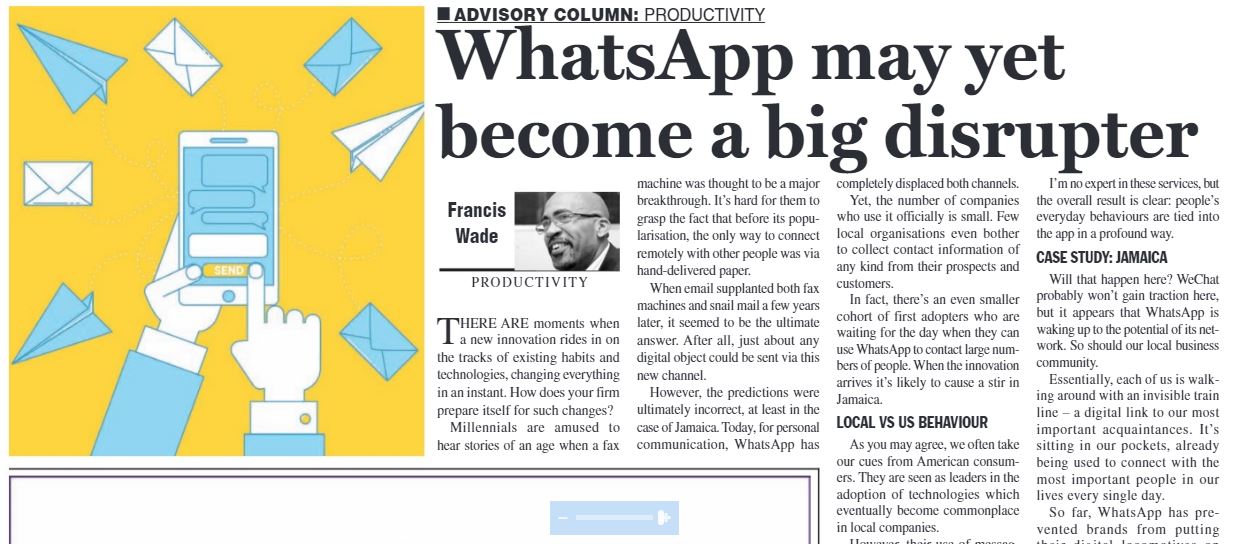There are moments when a new innovation rides in on the tracks of existing habits and technologies, changing everything in an instant. How does your firm prepare itself for such changes?
Millennials are amused to hear stories of an age when a fax machine was thought to be a major breakthrough. It’s hard for them to grasp the fact that before its popularization, the only way to connect remotely with other people was via hand-delivered paper.
When email supplanted both fax machines and snail mail a few years later, it seemed to be the ultimate answer. After all, just about any digital object could be sent via this new channel. However, the predictions were ultimately incorrect, at least in the case of Jamaica. Today, for personal communication, WhatsApp has completely displaced both channels.
Yet, the number of companies who use it officially is small. Few local organizations even bother to collect contact information of any kind from their prospects and customers.
In fact, there’s an even smaller cohort of first adopters who are waiting for the day when they can use WhatsApp to contact large numbers of people. When the innovation arrives it’s likely to cause a stir in Jamaica for the following reasons.
1. Local vs. U.S. Behavior As you may agree, we often take our cues from American consumers. They are seen as leaders in the adoption of technologies which eventually become commonplace in local companies.
However, their use of messaging apps differs remarkably from ours. In 2018, only 12.1% of mobile users in the U.S. connected with WhatsApp versus Facebook Messenger, which reached 56.8%.
If you live in Jamaica there’s no need to explain – WhatsApp is by far the dominant method for individual mobile communication. In a few short years, the majority have picked up the habit of daily usage.
However, due to restrictions put in place by Facebook, the owner of WhatsApp, even the early corporate adopters have been forced to stay with text messages and email channels. That is, they are stuck using methods most people are abandoning. Consequently, their messages are seen as an intrusion.
To see where they must go next, we need to look for examples outside North America.
2. Following the Chinese
Instead, we must pay attention to WeChat. Most Jamaicans have never heard of this Chinese-owned app, even though 700 million people use it every day for at least an hour. When it started, it was widely seen as a knock-off of WhatsApp and Facebook Messenger.
However, while both have limited their expansion into added features, WeChat took the opposite approach and added them at breakneck speed. Consequently, once users enter the app’s space they don’t have to leave because it offers them the following features, among many: – company mini-sites for customer interactions – payments – e-wallets for individual money transfers – social networking cash rewards for following a brand – gamification – group followership – attracting influencers.
I’m no expert in these services, but the overall result is clear: people’s everyday behaviors are tied into the app in a profound way. Will that happen here?
3. Case Study: Jamaica
WeChat probably won’t gain traction here, but it appears that WhatsApp is waking up to the potential of its network.
So should our local business community. Essentially, each of us is walking around with an invisible train line – a digital link to our most important acquaintances. It’s sitting in our pockets, already being used to connect with the most important people in our lives every single day.
So far, WhatsApp has prevented brands from putting their digital locomotives on these tracks, but that’s changing. The firm recently announced the release of a limited Business App for small companies. But there’s much more coming, they promised, with the release of their API (Application Program Interface.)
Soon, far more functionality will be made available including automation and mass messaging. In other words, the app is becoming more like WeChat. Will this become a more dramatic disruptor than fax machines or email? If you follow my reasoning, you may agree that it may be a rare case of a powerful service following already existing daily habits. As such, the learning curve could be practically non-existent.
If this piggy-backing occurs, it could instantly change the way local companies do everyday functions like customer service, advertisement and bill payment. It would be a disruption that gains its power from existing, but seemingly innocuous habits.
Whether this transformation happens or not local companies need to pay attention. Seemingly small, boutique technologies can have huge effects that overturn industries. Consider this a clear warning: CEO’s must invest time and effort to appreciate the ultimate impact of digital disruptions that they may not initially even notice.

